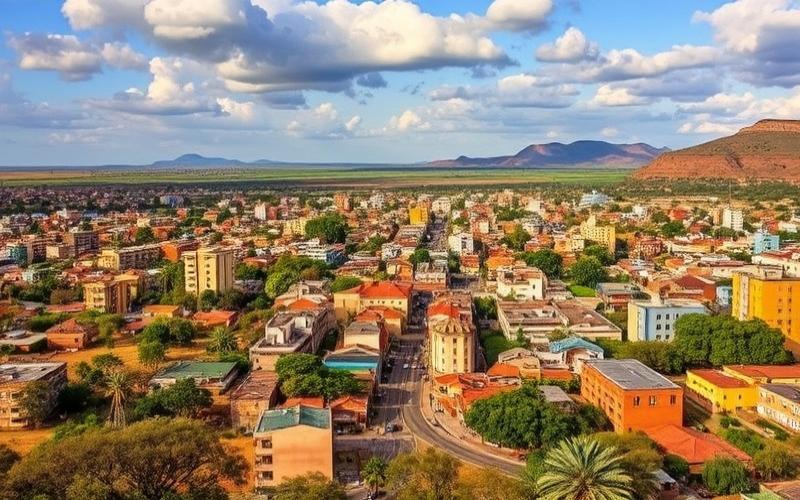
 Published on and written by Cyril Jarnias
Published on and written by Cyril Jarnias
In South Africa’s dynamic landscape, real estate investment offers a multitude of lucrative opportunities, attracting numerous investors seeking diversification and optimized returns. Particularly, attractive tax incentives play a crucial role, allowing investors to reduce their tax burden and enhance their profitability. However, it is essential to navigate cautiously through the various local restrictions and regulations, which, although they may seem complex, provide a protective structure to ensure a safe and sustainable investment environment. This article explores the tax benefits and key restrictions shaping real estate investment in South Africa, offering readers practical advice to maximize their success in this ever-evolving market.
Real Estate Investment in South Africa: An Overview of Opportunities
Analysis of Key Attractive Regions for Real Estate Investment in South Africa
The most attractive cities are Johannesburg, Cape Town, and Durban, each presenting specific advantages for real estate investors:
| City | Main Advantages | Popular Neighborhoods |
|---|---|---|
| Johannesburg | Largest city, economic hub, strong population growth, sustained rental demand | Sandton, Rosebank, Bryanston, Fourways |
| Cape Town | Tourist appeal, exceptional views, stability in the high-end market | Camps Bay, Waterfront, wine region |
| Durban | Major port, subtropical climate, appeal for vacation homes and seasonal rentals | Umhlanga, La Lucia, Berea |
Types of In-Demand Real Estate Properties
- Urban Residences: apartments and townhouses sought after by young professionals and families in urban areas.
- Office Buildings: high demand in business centers, especially in Johannesburg and Cape Town, where business district development continues.
- Vacation Properties: houses and apartments with ocean views or near beaches, particularly popular in Cape Town and Durban.
Overview of the Rental Market and Yield Potential
- Rental Yield in Johannesburg: between 7 and 8% on average, thanks to constant demand from the growing population and economic dynamism.
- Rental Yield in Cape Town: between 6 and 7%, with strong demand for quality properties and tourist neighborhoods.
- Diverse Rental Market: the presence of students, expatriate professionals, and a growing middle class supports rental demand in major urban areas.
Recent or Upcoming Development Projects
- Johannesburg Region: launch of major residential projects, including the construction of over 1000 rental apartments to improve access to affordable housing.
- Cape Town: construction of the mixed-use “Rubik” building in the city center, combining luxury apartments, high-end offices, and modern commercial spaces.
- Ongoing Urban Expansion: development of peripheral neighborhoods and new infrastructure to accommodate demographic and economic growth.
Economic and Political Factors Influencing the Sector
- Relative Economic Stability: despite macroeconomic challenges, real estate remains perceived as a safe haven.
- Housing Support Policies: public and private investments to increase the supply of affordable housing.
- Regulation: potential changes in laws on foreign ownership and real estate taxation, likely to impact market attractiveness.
- Risks to Monitor:
- High unemployment rate potentially limiting rental solvency.
- Fluctuations in the South African rand influencing profitability for international investors.
- Security and political stability issues potentially affecting country risk perception.
South Africa offers a dynamic real estate market, particularly in its major metropolitan areas, with attractive rental yields and strong long-term appreciation potential, provided economic and regulatory developments are closely monitored.
Good to Know:
Johannesburg, Cape Town, and Durban stand out as attractive hubs thanks to their recent development projects and a dynamic rental market, offering interesting opportunities in urban residences and office buildings. Investments in these cities are supported by favorable regulation and resilience against inflation, although political factors may influence the sector.
Tax Benefits of Buying a House in South Africa
Main Tax Benefits Associated with Buying a House in South Africa
- Exemption or Reduction of Transfer Duty
The purchase of a property in South Africa is subject to a progressive transfer duty scale, but there is a total exemption for real estate valued at no more than 1,100,000 ZAR. For example, for a house bought for 1 million ZAR (~€54,000 in November 2024), no transfer duty is due. Beyond that, rates are tiered based on the property’s value and can represent savings of several thousand euros on the acquisition. - Tax Deductions on Loan Interest
For investors financing their purchase through a loan, only the interest related to a mortgage intended to generate rental income is deductible from taxable rental income. This means that if you rent out the property, you can reduce your taxable base through the interest paid annually. - Provisions Regarding Capital Gains Tax (CGT) Upon Resale
| Status | Main Exemption | Effective CGT Rate |
|---|---|---|
| Tax Resident | Up to 2 million ZAR on primary residence | Approximately 18% (individuals) |
| Non-Resident | No specific exemption; taxation only on the gain related to the South African property | Same rate as residents |
To illustrate: if a resident sells their primary residence with a capital gain less than or equal to two million ZAR (~€108,000), this gain is completely exempt. Beyond that or for a secondary/residential property, only a portion of the gain is taxable under CGT.
Tax Incentives Offered to Foreign Investors
- Non-residents have the right to buy and own property directly.
- No specific additional tax is applied to foreigners upon purchase.
- Possibility for certain profiles (notably in strategic areas or via certain “Greenfield” projects) to benefit from incentives such as:
- Direct grants for studies and infrastructure
- Tax relief within industrial programs
- Sector-specific aids (e.g., automotive sector)
Concrete Example:
A foreign investor acquires a new apartment intended for seasonal rental:
- Purchase: exempt from any duty up to approximately ~€54,000
- Annual interest paid: deductible if declared as rental income
- Resale after appreciation: taxation only on the capital gain realized locally
Differences Between Residents and Non-Residents
Residents generally benefit more:
- Increased exemption on the primary residence;
- Possible deduction of expenses related to the loan;
- Easier access to local credit.
Non-residents must pay attention:
- To keep all international bank records during the initial transfer to avoid any future tax complications,
- To currency fluctuations impacting their actual investment,
- To the partial or total absence of specific exemptions reserved for South African first-time homebuyers.
Recent Tax Reforms That May Influence These Benefits
Regular adjustments are made, particularly to the threshold triggering partial/total exemption of transfer duties to keep pace with local inflation. Similarly, the scope of incentive programs evolves according to industrial and regional priorities set by Pretoria—projects promoting local creation or exports being particularly targeted in recent years.
Key Takeaways
Real estate purchase in South Africa combines attractive taxation (reduced duties/significant exemptions), real potential for rental profitability optimized by targeted deductions, and legal stability favorable to both residents and international investors, though each has distinct frameworks based on their status.
Good to Know:
First-time homebuyers in South Africa can benefit from a transfer duty exemption up to 1.1 million ZAR, while loan interest for the purchase of a primary residence is tax-deductible; for foreign investors, specific reductions apply to capital gains tax, especially following the 2021 reforms.
Restrictions and Regulations on Real Estate Investments
Laws and Regulations Related to Foreign and Local Real Estate Investments
South Africa imposes few restrictions on foreign private property ownership. Foreign investors can acquire real estate, create companies, or buy South African assets, generally through local subsidiaries or private companies.
The main laws are the Investment Act, the Competition Act (amended in 2019, allowing the state to block mergers involving foreign interests for national security reasons in certain sectors), and the Companies Act.
Some sectoral limits exist: foreign ownership is restricted in agriculture, fishing, mining and energy resources, broadcasting, defense, telecommunications, and transport.
Acquisition of Properties by Non-Residents
Non-residents can acquire real estate properties in South Africa but must appoint a South African resident as the legal representative of the company.
Company registration must be completed within 21 days of creation, with mandatory tax registration.
Acquisitions by non-residents require approval from the Financial Surveillance Department of the South African Reserve Bank or an authorized dealer for exchange control.
Limits on Land Ownership
No general limit is imposed on foreign land ownership, except in the strategic sectors mentioned above.
The new Expropriation Act (January 23, 2025) allows the state to seize private land in the public interest, including without compensation in particular cases (abandoned, unproductive, or over-indebted land).
Reporting Requirements and Administrative Processes
Foreign investors must generally:
- Appoint an auditor and legal advisors.
- Declare any acquisition or disposal of shares in unlisted South African companies.
- Register with tax authorities.
InvestSA, the dedicated government agency, assists investors with regulatory procedures, license issuance, company registration, and work permit acquisition.
Exchange Control and Profit Repatriation
The exchange control regime is managed by the South African Reserve Bank. Any transaction involving non-residents, including profit repatriation, must be approved and reported in accordance with exchange control regulations.
Profits earned can be repatriated provided reporting requirements are met and approval from the competent authorities is obtained.
Involved Government Entities
| Entity | Main Role |
|---|---|
| South African Reserve Bank | Exchange control, approval of international transactions |
| InvestSA | Facilitation and support for foreign investors |
| Department of Rural Development | Land management and monitoring of land policies |
| Department of Finance | Tax regulation, investment policy |
| Competition Commission | Review of acquisitions/mergers for national security |
Recent Examples
In 2025, the enactment of the new Expropriation Act allowed the state to seize abandoned or unmaintained land or buildings, sometimes without compensation, in the public interest.
Acquisitions of South African companies by foreign groups in the energy or banking sectors have been subjected to thorough review by the Competition Commission and may be blocked if national security issues are identified.
Summary of Main Obligations for Foreign Real Estate Investors
- Register the company locally and comply with taxation.
- Appoint a resident representative and an auditor.
- Obtain approval for international fund transfers.
- Declare share acquisitions and comply with exchange control rules.
- Adhere to specific sectoral laws where applicable.
Restrictions are limited but strict oversight exists for strategic sectors, administrative compliance, and control of international financial flows.
Good to Know:
In South Africa, non-residents can buy real estate but must adhere to strict rules like exchange control, which regulates the repatriation of profits abroad. Real estate transactions by foreign investors must also be reported to the South African Reserve Bank, and any land acquisition by a foreigner excludes the purchase of agricultural land.
Investment in Agricultural Land in South Africa
Opportunities for Investors in South African Agricultural Land
South Africa benefits from a modern and highly diversified agriculture, offering investors opportunities in several sectors:
- Major Crops: corn, soybeans, sunflower, wheat, and transgenic cotton.
- Mixed Farming: nearly 12,500 commercial farms combining livestock and field crops.
- Agribusiness and Food Processing with strong export potential to Europe, the Middle East, and Asia.
- Innovative Agricultural Technologies: precision irrigation (25 to 30% of irrigated areas), conservation agriculture (no-till on 30% of areas), energy-efficient or biomass equipment.
The most promising sectors include grain production (corn/soybeans/wheat), viticulture, organic/transgenic agriculture, as well as the development of infrastructure related to the agricultural supply chain.
Specific Tax Advantages Compared to Other Real Estate Investments
- Partial exemptions or tax deductions for certain intensive or innovative agricultural activities.
- Possibility to benefit from the agricultural tax regime on certain land income from lands farmed directly or via local farmers.
- Reduced VAT on several agricultural inputs compared to the classic real estate sector.
| Type of Investment | Tax Deductions | Reduced VAT | Sectoral Exemptions |
|---|---|---|---|
| Agricultural Land | Yes | Yes | Yes |
| Residential Real Estate | No | No | Rare |
| Commercial Real Estate | Limited | No | Very Rare |
Main Legal Restrictions and Regulations for Foreigners
List of major constraints:
- Non-residents can acquire land subject to compliance with local law; however, they must generally go through an entity registered in South Africa (private company or trust).
- Certain strategic areas are subject to restrictions or enhanced control, particularly regarding environmental/conservation matters.
- Recent projects aim to further regulate foreign ownership without a general prohibition; trend towards increased regulation but no formal ban currently.
Current Trends in the South African Agricultural Land Market
Factors influencing the market:
- Growing demand linked to agribusiness development and food exports
- Moderate average price increase in fertile regions; marked volatility depending on crop type (grains vs. vines)
Indicative examples:
| Region | Average Price/Hectare (€) |
|---|---|
| Western Cape | 2,000 – 8,000 |
| Free State | 1,500 – 5,000 |
Main influences: water availability (high water-related risk), regulatory evolution, technological investment.
Examples Illustrating Possible Risks & Benefits
Succinct list:
Successes:
- Viticulture development in the Western Cape with high profitability thanks to exports to EU/China
- Mass adoption of smart irrigation allowing doubling of grain yields
Failures:
- Unanticipated investments facing repeated droughts leading to partial or total loss
- Speculative acquisition hindered by administrative blockages related to new land laws
Government & Private Initiatives to Support Agricultural Investment
Main measures:
- Public support for rural/agricultural credit via specialized institutions
- Private/agritech programs facilitating access to innovative technologies
- Reforms encouraging agronomic vocational training
| Initiative | Beneficiaries |
|---|---|
| Equipment Subsidies | SME Farmers |
| Subsidized Credits | Young Farmers |
Expert Analyses & Recent Reports
Analysts emphasize that “South Africa remains the African leader in agricultural productivity” but that “sustainable water resource management will be decisive.” Prospects remain positive for investors capable of integrating technological innovations while adapting their strategy to regulatory changes. Recent studies also point to the need “to better organize local sectors to increase sectoral resilience.”
Investment in South African agricultural land combines substantial opportunities but requires strategic caution in the face of climatic/regulatory challenges.
Good to Know:
South African agricultural lands offer attractive investment opportunities in the flourishing sectors of viticulture and tropical fruits, benefiting from specific tax advantages such as partial exemption from profit taxes for local investors; however, foreigners must navigate strict regulations limiting direct land acquisition, often requiring local partnerships.
Disclaimer: The information provided on this website is for informational purposes only and does not constitute financial, legal, or professional advice. We encourage you to consult qualified experts before making any investment, real estate, or expatriation decisions. Although we strive to maintain up-to-date and accurate information, we do not guarantee the completeness, accuracy, or timeliness of the proposed content. As investment and expatriation involve risks, we disclaim any liability for potential losses or damages arising from the use of this site. Your use of this site confirms your acceptance of these terms and your understanding of the associated risks.
























































